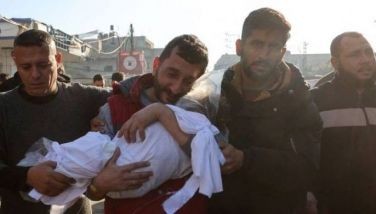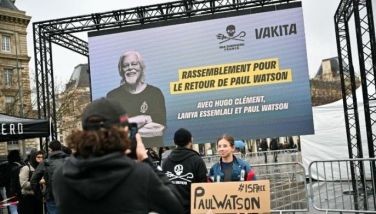Thin veneer of normalcy in Syria's wartime capital
DAMASCUS — Even in the capital of a country torn apart by civil war, Syrians have to find some way to enjoy themselves on a hot summer weekend.
So the pool at a Damascus luxury hotel was packed on a recent afternoon. The children playing in the water paid no attention to the frequent thump of artillery and shells from fighting on the city outskirts.
"This part of Damascus, the center, is like Paris. But beyond that, you don't go," said a 26-year-old bank employee, lounging on the deck with his buddies, who took puffs from a thick cigar they passed among themselves. Like several others who spoke to The Associated Press, he talked on condition he not be identified, wary about drawing the attention of either side in the conflict.
Not that the center is entirely safe. Just a day earlier, a mortar fired by rebels on the city edges landed just a block from the hotel, across the street from a church, knocking a chunk off the balcony of an apartment building. A few days later, on Monday, another mortar hit a neighboring mosque, cracking its minaret and killing a passer-by.
The veneer of normalcy is thin in Damascus, the stronghold of President Bashar Assad's rule, at a time when a conflict that has dragged on more for than 2 1/2 years nears a potentially crucial juncture: possible US and Western airstrikes against the Syrian military in retaliation for an alleged chemical weapons attack last week.
Firmly in the hands of the state and the military, the capital has been spared the widespread destruction wreaked on battle zone cities such as Aleppo and the rebel-held districts on Damascus' outskirts. Instead, the city of around 2 million feels small and hemmed in.
For much of the conflict, it has been cut off from its hinterland, the densely populated towns and villages that surround it in the area known as "Rif Dimashq," or "the Damascus Countryside." Rebels have controlled most of the Rif since last year, and regime forces have launched repeated assaults trying to dislodge them, devastating the area.
Nearly daily last week, military artillery stationed on Qassioun Mountain, the plateau that overlooks the capital from the north, bombarded the rebel-held suburbs east of the capital, just a 20-minute drive from downtown.
The shelling sent booming echoes across the city, raising the occasional plume of smoke in the east. Rebels in the Rif responded with rounds of mortars that fell into Damascus's eastern neighborhoods.
In the middle-class district of East Tijara, a 70-year-old retired government employee looked glumly at the burned-out husk of his 1993 Volvo, which took a direct mortar hit only a half-hour earlier. A hole in the crumpled roof showed the impact, the interior was mangled and charred.
"We'll have to throw it out," he sighed. "It's the only car I have."
The rebel-held area of Jobar is only a few blocks away, on the other side of a main boulevard. Beyond it stretches the East Ghouta region, where last week's alleged chemical attack took place, killing hundreds. There, the destruction is far more extensive.
Once, the Rif Dimashq was intimately linked to the capital. Farms in Ghouta provided much of Damascus' produce and dairy products. Many Damascenes would go on days off to Ghouta for family barbeques in its gardens and fields.
Now, residents of the capital talk of it like a zone of death, where no one dares to go.
"We used to have the life of princes and kings. Better than princes and kings," said Abboud Mardini, who runs a grocery store in East Tijara. "We would go out at 10 p.m., come home at 2 or 3 in the morning. ... Not anymore."
Hanging over everyone are the country's economic woes — the Syrian pound has dropped in value, to nearly 200 to the dollar in the black market, compared to 50 before the conflict.
That's just one factor fueling inflation. Officials have said industrial and agricultural production has been cut in half because of fighting. Transport around the country has become more difficult, with roads cut off.
Mardini said he used to get the yoghurt he sells from the northern city of Aleppo, but that source has been cut off by the months-long battle for control there between government forces and rebels.
So now he only gets a trickle of supplies from the central city of Hama. And yoghurt that used to go for 60 pounds a canister now goes for 225.
Still, the city maintains a determined liveliness. Damascenes still go out at night to sit at the city's outdoor cafes, particularly in the upper-class districts, which are nestled in central areas more insulated from the outskirts.
But they head home around 10 p.m., cautious of staying out too late.
During the day, traffic is heavy. But in a sign of the conflict, checkpoints are set up on most major intersections and at entrances to each neighborhood, manned by soldiers or civilian defense groups. They search through the lined-up cars, popping open hoods and checking IDs to prevent weapons smuggling or car bombs, which have struck repeatedly in the city's heart.
At one checkpoint at an intersection near the outer district of Qusaa, a young soldier said their position came under fire several weeks ago from rebels who infiltrated into the city, using a building on the other side of a nearby graveyard to shoot down at them. They stormed the building and drove them out, but were unable to catch the rebels, he said.
The soldier, who refused to be identified in accordance with military rules, was a member of Syria's Shiite minority, and said his home village up in the northern province of Idlib, by the Turkish border, was surrounded by rebels.
The city has also been swamped by an influx of Syrians fleeing from war-torn parts of the country, particularly the Rif. Some move in with relatives, while others search for apartments, causing a spike in rents. The poorest set up tents in highway medians and city parks. With little to do, displaced families wander through the city's historic Souq al-Hamediya market.
"They just look, they never buy," said Hassan al-Qadi, a gold-seller in the Souq. His business has plunged as residents concentrate on buying the essentials and avoid luxuries. His main clients now are people who have some extra money they want to protect — but they buy raw gold from him, not anything with workmanship, so his profit margins are lower.
"It used to be that people bought gold when they got married. But now they just buy the fake stuff," al-Qadi said. "At most they'll buy a ring."
- Latest
- Trending

































